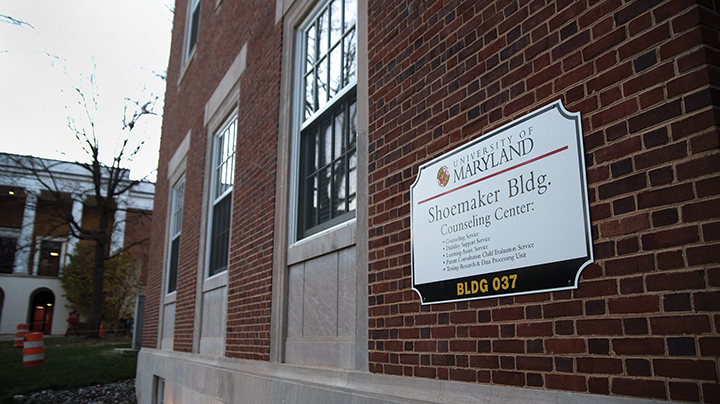Following a year filled with political division and racial tension, the University of Maryland’s Counseling Center’s intake and emergency appointments increased by as much as 24 percent, according to its annual report.
The center had about 250 more intake appointments in the 2016-17 academic year than the one before — an increase of about 11 percent. The number of emergency appointments jumped to 299, which is up about 24 percent from the previous school year. Emergency appointments are called for situations involving suicide, panic attacks, or other personal crises.
Last school year’s intake appointment uptick represents a 24 percent increase from the three-year average.
Noah Collins, the center’s associate director, said some of this increase could possibly be attributed to the political climate since the presidential election, “increasing incidents of hate” and national “divisions in culture,” among other trends, such as the lowering of stigma associated with seeking services.
[Read more: Students advocate for more mental health resources for UMD’s undocumented immigrants]
The fatal stabbing of Richard Collins, a black Bowie State University student, near the Montgomery Hall bus stop in May has left many students shaken. Sean Urbanski, a white former student at this university, has been indicted on one count of murder in connection with the stabbing, which is being investigated as a possible hate crime.
The center’s report described the 2016-17 academic year as “unpredictable, unusual, and transformational,” citing Collins’ death, as well as “hate-filled assaults against marginalized communities on and off campus.”
Last school year, there were five reports of white nationalist posters found around the campus, and a noose was found inside a fraternity house. All are being investigated as hate bias incidents.
“We have seen students coming in around … feelings about the election, feelings about hate incidents that have happened around campus, the murder of Lt. Collins, so there have been people specifically coming in due to those things,” said María Berbery, a staff psychologist.
In April, chalkings were found outside Stamp Student Union that included messages such as “Build the wall” and “Deport Dreamers.”
“[The chalkings] did get some anxieties up about students wondering who they’re with and whether they feel like they can disclose their status as an undocumented student here, even with professors, feeling nervous about disclosing that, what might be done with that information, whether it will be kept confidential or if it could be reported somewhere,” Berbery said.
People are talking about these types of issues more and more, said Chandni Shah, a staff psychologist, and hearing different opinions and messages about them — whether they’re hateful or not — can be triggering for some students.
Recently, some students with Deferred Action for Childhood Arrivals — a program that allows those who came to the U.S. illegally as young children to work and study in two-year blocks — have come into the center following President Trump’s decision to phase out the program, Berbery said.
[Read more: UMD training to serve undocumented students grows since President Trump’s election]
The center typically considers events like these emergencies, and students don’t have to schedule something in advance to get an appointment, she added.
Berbery said students with DACA may face anxieties surrounding their future, including whether they will be able to stay in school, what their careers could look like and the possibility of being deported to a country they only knew as a small child.
In response to these types of events, the center has collaborated with campus departments and offices to help them facilitate conversations or manage grief, served as consultants for initiatives the campus is undertaking in the wake of Collins’ death and increased services and outreach initiatives.
For example, the center is currently starting a new support group called “Surviving and Thriving in a Confusing World.”
Shah, who is helping start the group, said it will be for students who feel harassed, threatened or targeted based on their identities because of “the political climate and sociopolitical events.”
“This could be a good fit, too, for students that are worried about themselves, or family, and kind of navigating this world, whether it’s related to DACA, whether it’s related to forms of racism, forms of homophobia, xenophobia [or] sexism,” Shah said.
The center hasn’t decided on the first meeting yet, as they are focusing on recruiting members, meeting students to make sure it’s a good fit for them and on getting the word out, Shah said.
Sharon Kirkland-Gordon, the center’s director, said there is “certainly an uptick” in the number of students interested in and attending support groups offered on the campus.
The number of students attending group counseling rose by 12 percent last school year, and the number of group appointments increased by 29 percent, according to the annual report.
“We see it as a really effective intervention, and probably in some cases much more effective than individual,” Kirkland-Gordon said. “It gets people to move along much quicker. And over the years we have not had to sell it as hard as we did in the past. Students kind of seek it out. They like the idea of kind of being in a setting where people have similar issues. It’s validating and that validation makes it more healing.”
The center also offers walk-in hours for special populations, such as students of color, LGBTQ students and veterans, every Monday through Friday from 3 p.m. to 4 p.m.
Collins said he’s noticed some of these appointments have increased as well, especially among people of color and members of the LGBTQ community.
“As there’s an event that’s really kind of up, we take that into consideration to make sure that we’re really responding to what’s going on for students currently,” Collins said. “We’ve also increased a lot — our outreach and work across campus has increased a great deal as well. … We’re doing a lot more services out there for groups of students, groups of staff around these issues.”



